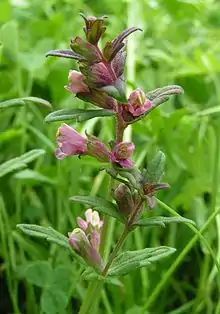Odontites vernus
Odontites vernus, the red bartsia,[1][2] is a wild flower from the family Orobanchaceae native to Europe and Asia and occurring as an alien in North America.[3] The red bartsia is a common plant in low-fertility soils, where it lives partially as a parasite on the roots of grasses.[4] The red bartsia has pinkish and red flowers from June to September. They prefer dry conditions and full sun light exposure and are pollinated by bees and wasps.[4]
| Odontites vernus | |
|---|---|
 | |
| Scientific classification | |
| Kingdom: | Plantae |
| Clade: | Tracheophytes |
| Clade: | Angiosperms |
| Clade: | Eudicots |
| Clade: | Asterids |
| Order: | Lamiales |
| Family: | Orobanchaceae |
| Genus: | Odontites |
| Species: | O. vernus |
| Binomial name | |
| Odontites vernus | |
Over the last 70 years, the red bartsia has disappeared from many woodland locations in the English county of Dorset.[5]
In Manitoba, Canada, the plant known as red bartsia is considered a weed.[6]
Etymology
Odontites is derived from Greek and means 'tooth-related', a name which is in reference to Pliny the Elder using it to treat toothaches. Vernus means 'of the spring' (vernal).[7]
References
- BSBI List 2007 (xls). Botanical Society of Britain and Ireland. Archived from the original (xls) on 2015-06-26. Retrieved 2014-10-17.
- USDA, NRCS (n.d.). "Odontites vernus". The PLANTS Database (plants.usda.gov). Greensboro, North Carolina: National Plant Data Team. Retrieved 29 January 2016.
- "Red Bartsia (Odontites vernus)". Nearctica. 2003. Retrieved 23 July 2009.
- "Red Bartsia". Natural England. Retrieved 23 July 2009.
- "English woodlands are losing their character". Planet Earth online. 22 July 2009. Retrieved 23 July 2009.
- Manitoba. "How To Control Red Bartsia". manitoba.ca. Retrieved December 6, 2015.
Red bartsia (Odontites serotina) is a weed of hayland, pastures and roadsides which appeared in the Interlake region of Manitoba in the 1950s... The weed apparently was introduced into the area in crates which were shipped from West Germany into the Canadian Armed Forces Base at Gimli. The infestation started on the base and spread into surrounding farmland by way of mowed hay from red bartsia infested areas along the edges of runways.
- Gledhill, David (2008). "The Names of Plants". Cambridge University Press. ISBN 9780521866453 (hardback), ISBN 9780521685535 (paperback). pp 278, 400